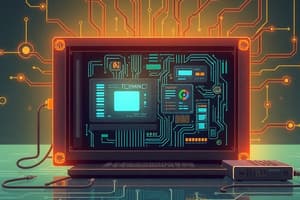Podcast
Questions and Answers
What is software?
What is software?
- A networking protocol
- A way to connect devices
- A collection of instructions and data (correct)
- A type of computer hardware
Which type of software manages and controls computer hardware components?
Which type of software manages and controls computer hardware components?
- Programming Languages
- System Software (correct)
- Productivity Software
- Application Software
What is an example of a programming language?
What is an example of a programming language?
- Photoshop
- Operating System
- Microsoft Office
- Java (correct)
What is a characteristic of software?
What is a characteristic of software?
What is the process used to design, develop, test, and deliver software?
What is the process used to design, develop, test, and deliver software?
What is an example of open-source software?
What is an example of open-source software?
What is an example of productivity software?
What is an example of productivity software?
What is a type of software that provides a service to users?
What is a type of software that provides a service to users?
Flashcards are hidden until you start studying
Study Notes
Definition
- Software refers to a set of instructions or programs that tell a computer what to do.
- It is a collection of data, instructions, and algorithms that tell a computer how to perform a specific task.
Types of Software
- System Software: manages and controls computer hardware components and provides a platform for running application software. Examples: operating systems, device drivers, and utilities.
- Application Software: performs specific tasks or provides services to users. Examples: word processors, web browsers, and games.
- Programming Languages: used to write software programs. Examples: Java, Python, and C++.
Characteristics
- Intangibility: software is an intangible product, meaning it can't be physically touched.
- Customizability: software can be modified or customized to meet specific user needs.
- Reusability: software can be reused in different applications and environments.
Software Development
- SDLC (Software Development Life Cycle): a process used to design, develop, test, and deliver software. Phases: planning, analysis, design, implementation, testing, and maintenance.
- Programming Paradigms: approaches to writing software code, including:
- Object-Oriented Programming (OOP): organizes code using objects and classes.
- Procedural Programming: uses procedures or functions to perform tasks.
- Functional Programming: uses pure functions to perform tasks.
Software Licensing
- Proprietary Software: owned by an individual or organization, with restrictions on use and modification.
- Open-Source Software: freely available, with users allowed to modify and distribute the software.
- Free Software: similar to open-source software, but with additional freedoms for users.
Software Applications
- Productivity Software: helps users perform tasks, such as Microsoft Office.
- Graphics and Design Software: used for creating visual content, such as Adobe Photoshop.
- Gaming Software: provides entertainment, such as video games.
- Enterprise Software: supports business operations, such as customer relationship management (CRM) systems.
Software Definition
- A set of instructions or programs that tell a computer what to do.
- A collection of data, instructions, and algorithms that perform a specific task.
Types of Software
- System Software: manages computer hardware, provides a platform for application software, and includes operating systems, device drivers, and utilities.
- Application Software: performs specific tasks or provides services, including word processors, web browsers, and games.
- Programming Languages: used to write software programs, such as Java, Python, and C++.
Software Characteristics
- Intangibility: software is an intangible product, cannot be physically touched.
- Customizability: software can be modified or customized to meet specific user needs.
- Reusability: software can be reused in different applications and environments.
Software Development
- SDLC (Software Development Life Cycle): a process used to design, develop, test, and deliver software.
- Phases: planning, analysis, design, implementation, testing, and maintenance.
- Programming Paradigms: approaches to writing software code, including: - Object-Oriented Programming (OOP): organizes code using objects and classes. - Procedural Programming: uses procedures or functions to perform tasks. - Functional Programming: uses pure functions to perform tasks.
Software Licensing
- Proprietary Software: owned by an individual or organization, with restrictions on use and modification.
- Open-Source Software: freely available, with users allowed to modify and distribute the software.
- Free Software: similar to open-source software, with additional freedoms for users.
Software Applications
- Productivity Software: helps users perform tasks, such as Microsoft Office.
- Graphics and Design Software: used for creating visual content, such as Adobe Photoshop.
- Gaming Software: provides entertainment, such as video games.
- Enterprise Software: supports business operations, such as customer relationship management (CRM) systems.
Studying That Suits You
Use AI to generate personalized quizzes and flashcards to suit your learning preferences.




